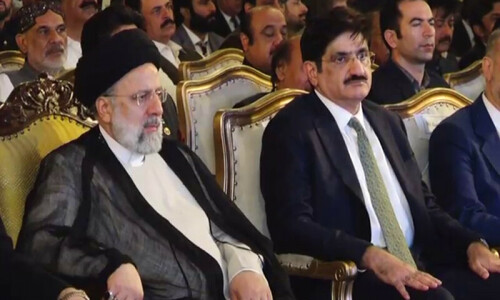
To the world beyond Islamabad, the victors were harder to call and the revolution tough to locate. After all, the vehement Qadri was not able to get the National Assembly dissolved this week, nor accomplish a sending away of the President or his Ministers. They all stayed in place, many of the reviled waving from the same podium where they had been denounced so heartily by the man in the silver cap. To the angry revolution seeker, the end was an anti-climax, a hand holding that seemed in its neat reliance on the basis of an agreement, of future meetings and detailed delineations wholly unsatisfactory. To those seeking relief from theocratic overtures, the relief was just as mixed, coming after too many crowds and too much capitulation and without the decisive excision that would thwart future attacks.
Dr Tahirul Qadri was playing to neither constituency. His followers, stalwart and whetted on the rhetoric of Karbala and the tribulations of early Muslims, did not come for a political victory but for a moral one. As he has done for decades, Maulana Tahirul Qadri was appealing not to those who wish for one or another Government, an installation of their own leader as Prime Minister, or even their own rebirth as political workers. The thrust of their support for him and the movement in general has been on moral reform, and the use of theological principles as the moral basis for evaluating their own lives and the lives of the polity. Under their lens then; the celebration was warranted precisely in the details that may have seemed trivial to those evaluating them from a political weighing scale. In signing an agreement that gives him the role of suggesting two names for the caretaker Prime Minister and provide the terms of screening candidates for the next election, Tahirul Qadri has positioned himself as the moral check on politics, the scolding Maulana ready to spank the dirty, naughty, immoral politicians.
In the old days and under the well-worn theses of democracy and Islamist politics, the recipe used to be the successful cooption of Islamism into the electoral system. This move, political scientists and theorists argued, brought Islamist parties into the pragmatic realm of consensus and compromise and away from hard line positions. The Muslim Brotherhood in Egypt and even the Refah Party of Turkey were offered as examples of those that brought Islamist constituencies into the system. It is this very recipe, trusted for so long, that has failed in Pakistan. Islamist parties like the Jamaat-e-Islami and the Jamaat Ulema Islam who function within the democratic system have failed to win over the constituency attracted to faith based spiritual and moral reformist movements or in the task of drawing them into the arena of democratic electoral politics.
The fallouts and turnaways from the political realm have instead chosen one of two parallel discourses, either the discourse of militancy or passive or active support of groups like Sunni Tehreek, Lashkar-e-Jhangvi and even the Tehreek-e-Taliban Pakistan. The misgivings of these groups against the democratic political system that they denounce as Western influenced and inherently corrupt, are known to all, as are their virulent attacks against state power, the killing of Governors and Ministers and Prime Ministers all boastful notches on their belt. Democracy is dirty and they spare no qualms in their efforts to destroy it. In lesser acts, they want to shut women up in homes and ban music and all sorts of entertainment.
The supporters of Dr Tahirul Qadri are the other fallouts from the political system. Unlike the hardliners, they do not believe in violent aggression or agitation; but are just as disenchanted with the nefarious corruption they see in the bribe-filled, lies laden halls of Government. They like music and believe women, modestly dressed, should be part of the public sphere After some decades parsing of the idea of “moral and spiritual reform” as the basis for change in the individual self, the family and the social sphere, they are ready now to amend the political sphere. Not interested in being co-opted themselves, their leader Dr Tahirul Qadri is positioning himself as the moral arbiter of the Pakistani political realm, a denominator in the question of who is moral enough to be a leader, caretaker Prime Minister or election candidate.
In most democracies this job of screening for ethics is fulfilled not by moral forces but by legal institutions. In an irony that demonstrated the failure of just that in Pakistan, the very first day of Dr Qadri’s sit-in saw the Supreme Court issue an order to arrest the Prime Minister; one that was duly ignored even as the time limit it specified languished and lapsed. The argument was clear; in a country where legality has not been able to function as a check on political ethics, it is morality, and in Pakistan’s case, religious morality that will step in and complete the task. With the advent of thousands of such moral arbiters into Islamabad this past week, a new chapter has begun, that of the moral Maulana watching, checking and scolding the dirty politicians, into consensus and possibly submission.

The views expressed by this blogger and in the following reader comments do not necessarily reflect the views and policies of the Dawn Media Group.













































